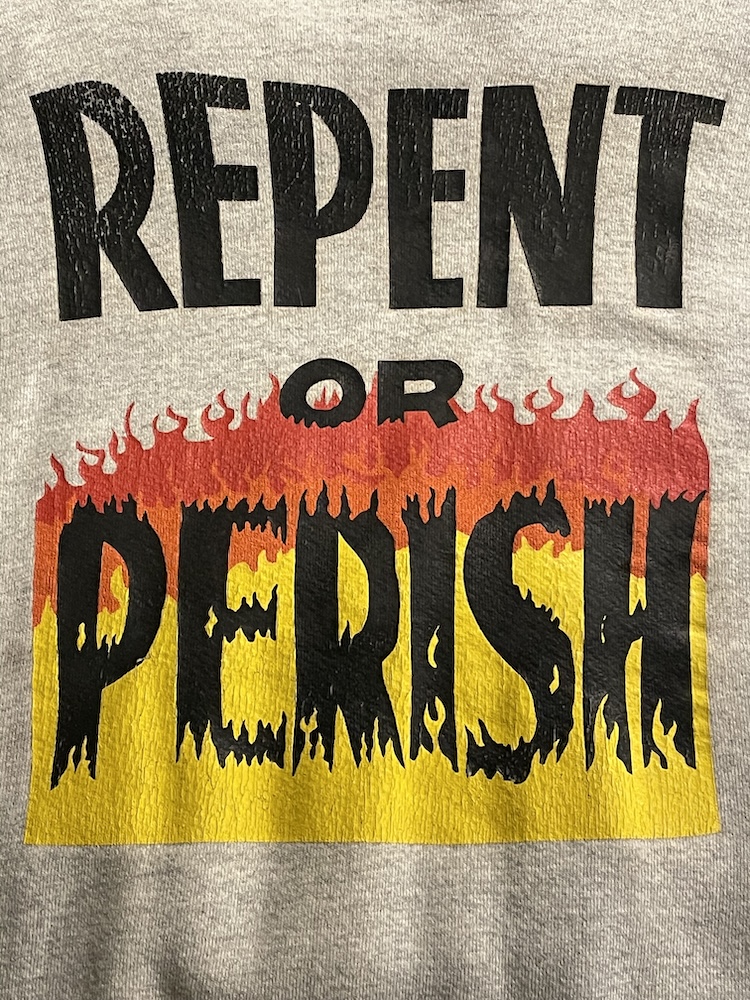A spiritual war is currently raging all around us. It is a war between the followers of Jesus Christ and the Bible and Satan, the god of this world, and his followers It is a battle to the death between the God of the Bible and the spirit of Antichrist. Sadly, many Christians and Jews are falling for the lies of the devil and defecting to the side of evil. What does the Bible, the Word of YHVH Elohim, have to say regarding the position that some well known “Christians” and even some Jews are taking against the Israel of God/Elohim, the Abrahamic Covenant, and the holy character of the God of Abraham, Isaac and Jacob and Yeshua/Jesus our Jewish Messiah? Whose side are some of these people really on? The side of YHVH Elohim or the side of Antichrist? According to the Bible, they are not on Elohim’s side as this video reveals. This is a wake up call for people who have crossed over to the side of Antichrist and are now on the wrong side of truth and history to repent of their sin before it is too late for them.
Category Archives: Sin, Wickedness, Evil, Judgment
The Descendants of Esau Were Israel’s Arch-Enemies in Bible Times & Will Be In the End Times
The Ancestry of Modern Arabs
The conflict between the Jews (and Christians) and the Arabs has ancient roots. In Genesis 32, Esau (the father of many of the modern Palestinians) and his army stood in the way preventing Jacob (the father of Jews and Israelites) and his descendants from returning to their homeland—the land YHVH had promised to them. This historical event is prophetic of what will happen in the end times as the Jews and the rest of the Israelites endeavor to receive their promised inheritance and the kingdom of Elohim.
Not only that, YHVH used Esau to test Jacob, who had grown overly self-confident due to his business acumen, wealth and his ability to produce a large family clan. In the ancient world and in a tribal sense, he had reached the pinnacle of wealth and power. However, what mattered to YHVH more than these things was the character of a man. Would Jacob have faith in his Creator, or would he trust in his own abilities to outwit his adversaries and come out on top as he had done twice previously with his brother Esau and Uncle Laban? Jacob’s confrontation with his brother at the threshold of the land of Israel and his wrestling with the Messenger from heaven were the two tests that he had to pass. The Bible calls this Jacob’s Trouble and prophesies that something similar will occur in the end times to Jacob’s descendants(Jer 30:7).
As we read in Genesis 32, Jacob divided his wives and children into two camps (Gen 32:1, 7). This was prophetic of what would eventually occur to the nation of Israel after the death of King Solomon. The one nation of Israel became two houses or kingdoms—the Northern Kingdom of Israel (Judah) and the Southern Kingdom of Israel (or the northern ten tribes). The descendants of these two kingdoms are presently—loosely speaking—the Jews and the Christians (we have discussed and proven this point biblically elsewhere). But who are the descendants of Esau historically and, more importantly, today, and why is it important to know?

Many, if not most of the modern Moslems (especially the Arabs) trace their lineage back if not biologically then spiritually to Ishmael, the son of Abraham by Hagar. Islam in its religious book, the Koran, claims that it was Abraham and Ishmael who founded the religion of Islam and built the Kaaba, which is the small building containing a stone that supposedly fell from heaven. This shrine is located in the midst of great mosque in Mecca, Saudi Arabia. Of Ishmael and his descendants, the Bible prophesies in Genesis 16:11–12,
The angel of YHVH said to her further, “Behold, you are with child, and you shall bear a son; and you shall call his name Ishmael, because YHVH has given heed to your affliction. And he will be a wild donkey of a man, his hand will be against everyone, and everyone’s hand will be against him; and he will live to the east of all his brothers.”
The Koran has further twisted the biblical account to declare that the patriarchs (i.e., Abraham, Isaac and Jacob) were actually Muslims, and that Abraham gave the birthright blessing to Ishmael instead of Isaac. Both Israelites and Arabs, therefore, believe that they have a right to the Promised Land of Canaan, and, hence, this disagreement is at the roots of the modern Arab-Israeli conflict.
The Scriptures further record that Esau (or Edom), the disinherited son of Isaac, also had ought against his brother Jacob, who, in a sense, stole the birthright promise from him. Furthermore, Esau married the daughter of Ishmael (Gen 28:9). Thus, some of Ishmael’s and Esau’s descendants merged becoming a people-group, who continued the jealous feud with the sons of Jacob or Israel.
The Bible has more to say prophetically about the descendants of Esau, who scripturally are referred to as Edom (Esau’s nickname) than about those of Ishmael. Edom is portrayed as an aggressive and bloodthirsty people, who are opposed to Israel at every step. We will discover what the Scripture have to say about this below.
In the mean time, let’s take a closer look at Edom.
- Esau and Edom (meaning “red”) are synonymous (see Gen 25:25, 30; 36:1, 8–9, 19, 43).
- Esau intermarried with the descendants of Ishmael (Gen 28:9).
- Seir is another name for the land of Edom (Gen 32:3; 33:16; 36:8).
- Esau intermarried with the people of Canaan (Gen 36:2), the Hittites, the Hivites, as well as the Ishmaelites.
- His descendants included the Amalekites (Gen 36:12, 16), who fought against the children of Israel upon leaving Egypt and as soon as they had entered the wilderness en route to the Promised Land (Exod 17:1).
- Esau’s sons were dukes or chieftains (or leaders of clans) and became kings (Gen 36:15–16, 40–43).
- Although Esau’s direct lineage was confined to the area of the traditional land of Edom, it is clear from the biblical record that he and his descendants intermarried with many of the neighboring nations, so that his descendants were scattered far and wide over the region that later became known as the Holy Land.
The entire one-chapter Book of Obadiahis a prophecy against Edom. Let’s note several key points in Obadiah’s prophecy that give us insights who the modern descendants of Edom are in light of end-time Bible prophecy. This will in turn help us to understand end-time world politics and give us a further clue to identifying America in prophecy. Let’s analyze some key verses in Obadiah in light of end-time events.
Verse 2, The descendants of Edom are greatly despised (scorned, held in contempt, disdained).
Verse 3, They dwell in the clefts (places of concealment, retreats) of the rocks. They are proud and view themselves as invincible.
Verse 4, YHVH promises to bring Edom down.
Verse 7, Edom has a confederacy (league, alliance) of nations, which include many of the modern Moslem and Arab nations.
Verse 11, Edom’s eyes are on Jerusalem. Edom along with his foreign allies will cast lots for Jerusalem (seek to divide it among the nations/religions of the world as an international city under the control of the United Nations?).
Verse 13, Edom has entered into the gates of the land of Israel in the day of her calamity or disaster.
Verse 14, Edom will kill Jewish refugees trying to escape the land of Israel in her time of distress.
Verse 15, The time frame of the fulfillment of these prophecies is “near” the day of YHVH, when he will judge Edom and the other heathen nations that have come against his people.
Verse 16, Edom will be drinking (celebrating?) on the Temple Mount or YHVH’s “holy mountain,” and, as a result, they shall drink the cup of YHVH’s wrath.
Verse 17, The house of Jacob will eventually retake possession of the Temple Mount.

How many descriptions of the modern Palestinian and other Islamic terrorists do we see in prophecies of Obadiah? What other people-group fits this description? Is Edom not a picture of many modern-day Palestinians and their Moslem backers who hate the Jews, the state or nation of Israel and America as well as Christians and Jews in general?
Elsewhere have discussed who Jacob represents in end-time Bible prophecy. Now we are discovering from the Scriptures who the arch-enemy of Jacob’s biological and spiritual descendants will be, and who will attempt to prevent them from returning to the land of Israel. This will happen in the end times before the coming of the Messiah. (I discuss this issue in more detail in my commentary on Genesis chapter 32 about “Jacob’s Trouble” as he encountered Esau when returning to the land of Canaan.)
Edom Has a Perpetual Hatred for Jacob (Judah and Ephraim)
As we have noted, Edom’s hatred for Israel has its roots in the antagonism between Ishmael and Isaac, and then afterwards between Esau and Jacob. The hatred that Esau had for Israel has been passed on down to successive generations of Edomites to modern times. The biblical prophets discusses this murderous antagonism on Edom’s part as being carried down generation to generation to the very end times. Let’s review some of these biblical prophecies.

Ezekiel 36 speaks about the conflict between end-times Edom and end-times Israel. In verse two, we see that the enemies of Israel have regarded the “ancient high [or declared, promised] places” of Israel as “ours in possession.” This is a clear reference to the holy places in Israel (e.g., the Temple Mount for the Jews and Bethlehem for the Christians—only in recent years have the Palestinians taken Bethlehem and forced—out of persecution and intimidation—the majority of the large Christian population of that city to leave). “High places” can also refer to the militarily strategic high places such as the Golan Heights, Mount Hermon and the ridges surrounding the eastern shores of the Sea of Galilee.
Next, let’s look at Ezekiel 35, which is another prophecy against Edom. In verses four through five, we see that end-times Edom will be devastated because of its perpetual hatred for the children of Israel. They have killed their enemies by the power of the sword. This is how Islam has traditionally spread—by the curved scimitar sword. Advancing Moslem armies force its captives to leave, covert or die. According to Ezekiel 35:5, this will be occurring during the time of the punishment (of the children of Israel?) at the time of the end (NAS) or the end of time (lit. Hebrew). This is another example of YHVH’s using Edom (Esau) to bring Ephraim and Judah to its knees in the time of the end.
Continue readingThe Origins of the Religion of Secular Humanism—the Mother of All Counterfeit Religious Systems

The Bible in Genesis chapter three speaks about a snake in a tree that gave the first humans a seemingly harmless fruit that when eaten would cause their eyes to be opened, so that now they would supposedly be like God and live forever. To the average person, what the serpent offered sounds like a good deal. Who doesn’t want to be like God and live forever? But beneath this ostensibly harmless and quaint Bible story, that when uncovered reveals a sinister side which is the root of all the evil that has occurred in the world from then until now. This seemingly harmless event is, in reality, the nascence of the epic and perennial struggle between good and evil that has plagued this earth from the beginning.
To comprehend fully the nature of this struggle, it is essential first to understand who the key figures are in this story, that is, who is the Protagonist and the antagonist. On the side of good is YHVH Elohim, who is a loving Father and the Creator of all there is including man, whom he created in his own image eventually be part of his spiritual family. He is the source of all goodness, beauty, righteousness, justice and truth. The Bible from beginning to end is revelation of this Supreme and Eternal Being whose name is Yehovah (or YHVH) Elohim. He his a grand and glorious plan to elevate man little-by-little from the physical level to the spiritual level, eternal level, in a similar way that a loving parent trains his or her child to become a mature, fully functioning adult.
On the other side was a serpent-like being who makes his first appearance on the earth’s stage in Genesis chapter three. To the first humans, the serpent presents alternative route to godhood. It was a way that circumvented YHVH Elohim. It was as if the serpent was attempting to kidnap the first humans to deceptively subvert them so they would turn away from their parents and go in a completely antithetical direction to the ways of their parents.
When can learn much about the nature of the pernicious serpent by examining the meaning of his biblical Hebrew name nachash—a word which is found 31 times in the Tanakh or Old Testament (OT). In the King James Bible, for example, nachash is translated as “serpent” in all cases. The Hebrew root of this word means “to practice divination, divine, observe signs, learn by experience, diligently observe, practice fortune-telling, take as an omen.” Nachash is almost identical to the Hebrew word for copper or bronze, and some scholars think that the two words are related because of the color, since some snakes are copper in color (i.e., America’s copperhead snakes). A cognate of these two words is n’hushtan, which is the bronze serpent that Moses made (Num 21:9–9). The LXX (the Greek translation of the OT translated nachash as ophis, the Greek word for snake, in all instances (see The TWOT). Although this passage doesn’t relate the serpent to Satan, the adversary, John makes this connection twice in Revelation (Rev 12:9; 20:2).
But there is even more to the word nachash as biblical scholar Michael Heiser points out. The meaning of nachash is both plain and elastic. The most literal meaning is “serpent.” When the Hebrew root letters n-ch-sh are a noun, the meaning is “serpent.” But n-ch-sh can also be a verb when different vowels are added (i.e., nochesh). It then means “diviner.” “Divination refers to communication with the supernatural world. A diviner in the ancient world was one who foretold omens or gave out divine information (or oracles)” (The Unseen Realm, p. 87). The consonants n-ch-sh can also form an alternate noun referring to copper or bronze smiths. Nechosheth is the Hebrew word for bronze and copper, which are shiny when polished, and which can be used to describe divine beings (Dan 10:6; ibid.). In the case of n-ch-sh in Genesis 3:1, Heiser believes that the writer wants the reader to think of all the possible meanings and nuances of the word. As such, he suggests that there are immediate clues in the story that the serpent is more than a mere snake, that he may be a divine adversary, and that the term nachash may be a triple entendre. Elsewhere, Scripture refers to the serpent as a cherub, a divine being who was a guardian of Elohim’s throne (Ezek 28:16 cp. Exod 15:18–22).
So how does this serpent-like, divine being who is advertorial in nature relate to our Genesis chapter three story and his tempting of the first humans to rebel against YHVH Elohim? It is this serpent-cherub who dispenses divine information used to lure Eve into sin, when he gave her the omen that if she ate of the fruit of the forbidden tree of knowledge that she wouldn’t really die, that her eyes would be opened and that she could be like Elohim without having to obey his instructions. Moreover, the serpent-cherub’s shiny appearance conveyed a divine nature, making the serpent more credible and believable. All of these meanings of n-ch-sh are consistent with what Genesis 3, Isaiah 14 and Ezekiel 28 reveal to us about the serpent (ibid, pp. 87–88).
Why is this background information so important in understanding the religion of secular humanism? This is because the first few verses of Genesis chapter three reveal that Satan, as YHVH’s arch-adversary is the originator of all the counterfeit religious systems of the world which are direct opposition to the truth of Elohim as revealed in the Bible. How is this? Let’s first review this passage of Scripture and then explain what we mean and how this is so. From the tree of the knowledge of good and evil, the following drama played out:
Now the serpent was more cunning than any beast of the field which the YHVH Elohim had made. And he said to the woman, “Has Elohim indeed said, ‘You shall not eat of every tree of the garden’?” And the woman said to the serpent, “We may eat the fruit of the trees of the garden; but of the fruit of the tree which is in the midst of the garden, Elohim has said, ‘You shall not eat it, nor shall you touch it, lest you die.’ “Then the serpent said to the woman, “You will not surely die. For Elohim knows that in the day you eat of it your eyes will be opened, and you will be like Elohim, knowing good and evil.” (Gen 3:1–5)
As we are about to discover, all of the world’s religious systems and man-made philosophies fall under the power and influence of the serpent’s lies that originated in the Garden of Eden at the tree of knowledge. These false system can broadly be defined as secular humanism.
What is secular humanism and how does the devil use it to further his rebellious opposition to Elohim? At its core, secular humanism (as defined by Francis Schaeffer in his book The Great Evangelical Disaster, p. 32) is freedom from all restraint and especially rebellion against Elohim’s biblical truth.
When Satan originally rebelled against Elohim, he attempted to dethrone the Creator and lift himself up in Elohim’s place (Isa 14:12–14). Here in the Garden of Eden, Satan the serpent employed the same subversive tactics as in his original, earlier rebellion. He attempted to subvert the will of the Creator by calling into question the character of Elohim to Adam and Eve. This was an attack against the character of the Creator. In modern terms, we refer to this as an ad hominem attack, where you attack a person’s character rather than addressing the facts of the issue at hand. In this way, the serpent successfully lowered man’s esteem for Elohim, and at the same time elevated man’s esteem for himself at Elohim’s expense. The biblical record reveals that this is a standard attack technique of Satan. He continually pits the forces of his kingdom behind anything that will compromise the authority of Elohim by attacking the character of the Creator. Once the Creator is diminished if not eliminated from the scene in man’s thinking, it is upon this false foundation of evil lies, that the devil can then construct his own counterfeit kingdom that is in opposition to that of YHVH Elohim. The most notable example of this false (antichrist) kingdom is found in Revelation 13 where an end times worldwide system is described called Mystery Babylon the Great. There in a vision, John sees this false system likened a series of monster-like creatures, empowered by Satan, which stand in defiant opposition to Elohim. Similarly, in the end times, Satanic forces will infiltrate the Christian church and plant doctrines of demons and seeds of rebellion against the Word and will of Elohim (1 Tim 4:1).
Secular humanism at its most fundamental level seeks to dethrone Elohim as the Creator, Ruler, Lawgiver and Judge if not to eliminate him all together from having any influence in the affairs of men, and if possible, to relegate his memory to the trash of history as ancient fables contrived by primitive humans.
Humanism promotes the notion that now that Elohim has been dethroned, and man can now place himself on the throne of his life, thus usurping Elohim’s authority. This is all under the power and influence of Satan, of course, whether man is aware of this or not. Satan cares little if man sees him as the driving force behind this subversive movement, just as long Satan ultimately remains in charge.
At the core of humanistic philosophy is the assumption that man is innately good and sinless, instead of sinful and morally depraved as the Bible teaches. If man is the paragon of goodness and not evil, then he is now qualified to be the sole determiner of what is good and evil. Now, who needs an Elohim telling him what to do? Each person for himself is now the determiner of what is good and evil, hence the name the tree of the knowledge of good and evil. With Elohim out of the picture, man can now choose for himself what is good and evil. Schaeffer describes secular humanism this way.
[It is] a consensus that stands in total antithesis to the Christian truth at every point—including the denial of the supernatural; belief in the all-sufficiency of human reason; the rejection of the fall [of man into sin]; denial of the deity of Christ and his resurrection; belief in the perfectibility of Man; and the destruction of the Bible and with this has come a total moral breakdown” (Evangelical Disaster, pp. 35–36).
Schaeffer calls humanism “a fundamental conflict between ‘the wisdom of this world’ and the ‘wisdom of Elohim.” As previously noted, Satan is the originator and prime instigator behind the anti-Elohim religious philosophy of secular humanism. Satan’s rebellion against his Creator is characterized by the five “I will” statements of Isaiah 14:13–14, and which are summarized by his final assertion: “I will be like the Most High.” At the tree of knowledge, Satan disguised as a serpent successfully conned man into buying into this same idea that man can be like Elohim by rebelliously disregarding the Word of his Creator (Gen 3:4). To this day, the proponents of the secular humanist philosophy adhere to the idea that man is his own god, and that Elohim is either non-existent or, if he does exist, is irrelevant. Either way, man is his own god, is at the center of the universe, is the sole determiner of what is right and wrong, and in no way needs Elohim for anything, nor is man answerable to any Supreme Being for his actions.
Continue readingWhat Is True Biblical Repentance and Why YOU Need to Know

There is no salvation without true repentance!
What would you hear if you were to ask the average Christian to summarize the basic gospel message in one sentence? You might hear something like “Jesus loves you and has wonderful plan for your life.” Or you might hear, “Jesus died for your sins, so that you might go to heaven.” Some of the more “modern and progressive” or so-called “seeker friendly” Christians might say, “Come to Jesus and he’ll improve your self-esteem,” or “If you want good health and lots of wealth, come to Jesus.” But how does the Bible summarize the gospel message? That’s a question that almost nobody asks and no one knows or preaches about, even though the answer should be obvious to anyone who has read the Gospels. The truth is shocking and radically different from what most modern Christians think!
Matthew in his Gospel after describing the circumstances around the birth of Yeshua the Messiah, opens up by introducing the ministry of John the Baptist, the anointed prophet from heaven who came to prepare the way for the Messiah. The Gospel writers summarizes the preaching of John as “Repent, for the kingdom of heaven is at hand” (Matt 3:2). In the next chapter after his brief introduction to John’s ministry, Matthew then brings Yeshua the Messiah onto the scene. After Yeshua’s temptation in the wilderness, Matthew records, “From that time Yeshua began to preach and to say, ‘Repent, for the kingdom of heaven is at hand’” (Matt 4:17). Mark in his gospel records the same event as follows: “Now after John was put in prison, Yeshua came to Galilee, preaching the gospel of the kingdom of Elohim, and saying, ‘The time is fulfilled, and the kingdom of Elohim is at hand. Repent, and believe in the gospel’” (Mark 1:14–15). Finally, on the day of Pentecost after being pricked in their hearts by Peter’s convicting sermon, the crowd asked the apostle what they should do next. His answer was, “Repent, and let every one of you be baptized in the name of Yeshua the Messiah for the remission of sins; and you shall receive the gift of the Holy Spirit” (Acts 2:38). A central and recurring theme in all of these passages is the idea of repentance from sin—a biblical concept that is understood by few modern Christians, and a message that is seldom preached in modern pulpits anymore. All of this is in spite of the fact that the writer of the Epistle to the Hebrews refers to “repentance from dead works” as “one of the [six] elementary principles of Messiah [or the gospel message]” (Heb 6:1–3).
So what is repentance? How does Scripture define repentance? It is a Hebraic concept, so we must go back to the Hebrew Scriptures to discover the answer.
Hebrew Word Definitions

There are two biblical Hebrew words that together present the complete picture of what true biblical-based repentance is. The first word is nacham meaning “to be sorry, console oneself, repent, regret, comfort, be comforted.” According to The Theological Dictionary of the Old Testament (The TWOT), the origin of the root of this word seems to reflect the idea of “breathing deeply,” hence the physical display of one’s feelings, usually sorrow, compassion, or comfort. The root occurs in the Ugaritic…and is found in Old Testament (OT or Tanakh) proper names such as Nehemiah, Nahum and Menehem. The Greek Septuagint (or lxx) translates the Hebrew word nacham by the two Greek words metanoeo and metamelomai. The Greek word metanoeo means “to change one’s mind, that is, to repent or to change one’s mind for better, heartily to amend with abhorrence of one’s past sins.” Wilson’s Old Testament Word Studies says this of nacham:

In regard to others, to pity, to have compassion…in regard to one’s own doing, to lament, to grieve; hence to repent; in English, to rue; often of one who repents, grieves, for the evil he has brought upon another.” The New Strong’s Expanded Exhaustive Concordance says of nacham: to breathe strongly, by implication, to be sorry…to repent means to make a strong turning to a new course of action. The emphasis is on turning from a less desirable course. Comfort is derived from ‘com’ (with) and ‘fort’ (strength). Hence, when one repents, he exerts strength to change, to re-grasp the situation, and exert effort for the situation to make a different course of purpose and action. The stress is not upon new information or new facts which cause the change as it is upon the visible action taken.

The second Hebrew word is shuv (from which the Hebrew word teshuvah derives, which means “repentance”) meaning “to return, turn back, refresh, repair, restore.” The TWOT in its discussion of the Hebrew verb shuv states,
The Bible is rich in idioms describing man’s responsibility in the process of repentance. Such phrases would include the following: “incline your heart unto [YHVH your Elohim]” (Josh 24:23); “circumcise yourselves to YHVH” (Jer 4:4); “wash your heart from wickedness” (Jer 4:14); “break up your fallow ground” (Hos 10:12); and so forth. All of these expressions of man’s penitential activity, however, are subsumed and summarized by this one verb shub. Far better than any other verb it combines in itself the two requisites of repentance: to turn from evil and to turn to the good.
In order to repent according to biblical criteria, one must understand that Scripture defines sins in the most basic terms as the violation of YHVH’s Torah, or instructions or teachings in righteousness (1 John 3:4). This basic concept can be expressed in several other ways as well. For example, all unrighteousness is sin (1 John 5:17). To fail to do what is right is also sin (Jas 4:17). It is also sin not to believe in Yeshua the Messiah (John 16:9).
The main Hebrew word for sin is chet, which in its loosest sense means “a failure in our relationship with Elohim.” Our goal should be to continually move closer to Elohim, but chet is any behavior (i.e. word, thought or deed or the failure to do what is right) that causes us to move away from Elohim.
If YHVH requires his people to repent of or to turn away from sin and then turn to righteousness, which is obedience to his commandments (Ps 119:172), then we must know what is involved in repentance. Repentance as expressed in the Hebrew word teshuvah, which comes from the Hebrew word shuv meaning “to return.” In the biblical context, it means “to return to Elohim” by returning to the righteous behavior that he requires of his people. In other words, repentance means a return to obeying his word or his commandments, which is the opposite of sin. While we must deeply regret our movement away from Elohim (i.e., nacham), we must not despair, for YHVH has provided the way for us to return to him, and he promises us that when we repent, he will forgive us without delay (Ps 103:3, 8–12; 1 John 1:9)
According to Scripture, there are, several basic steps to repentance. They are:
Recognize our sin. We must first recognize that we have a problem—that we are sinful to the core (Jer 17:9; Rom 8:7; Rom 3:10–18, 23; Isa 64:6). For this to happen, we have to come to grips with the fact that we have broken Elohim’s laws, which define sin (1 John 3:4; Jas 2:10; Rom 3:23). Human pride makes this step the hardest one to take (1 John 1:8).
Confess our sin. We must next confess our sin before YHVH (Lev 5:5; Num 5:7; Ps 32:5; 1 John 1:9).
Be sorry for our sins. We must manifest heartfelt regret for our wrong actions by evidencing remorse and contrition before YHVH and our fellow man, if applicable. The Hebrew word for this is nacham and according to The TWOT and as already noted above means, “to reflect the idea of ‘breathing deeply,’ hence the physical display of one’s feelings, usually sorrow, compassion, or comfort.” We see David expressing nacham in his thirty-eighth psalm.
For my iniquities have gone over my head; Like a heavy burden they are too heavy for me. My wounds are foul and festering because of my foolishness. I am troubled, I am bowed down greatly; I go mourning all the day long. For my loins are full of inflammation, and there is no soundness in my flesh. I am feeble and severely broken; I groan because of the turmoil of my heart.… For I will declare my iniquity; I will be in anguish over my sin. (Ps 38:4–8, 18)
Turn from our sins. After this, we must turn from our sins and resolve to stop sinning. This is expressed in the Hebrew word teshuvah meaning “to repent,” which is from the root word shub or shuv. The TWOT defines shuv as follows:
The Bible is rich in idioms describing man’s responsibility in the process of repentance. Such phrases include the following: “incline your heart unto [YHVH your Elohim]” (Josh 24:23); “circumcise yourselves to YHVH” (Jer 4:4); “wash your heart from wickedness” (Jer 4:14); “break up your fallow ground” (Hos 10:12); and so forth. All of these expressions of man’s penitential activity, however, are subsumed and summarized by this one verb shub. Far better than any other verb it combines in itself the two requisites of repentance: to turn from evil and to turn to the good.

The penalty price must be paid for our sins. Whenever a law is broken, a penalty must be paid. This is true with men’s civil laws as well as Elohim’s moral and spiritual laws. When a person breaks Elohim’s spiritual laws he comes under the penalty of the law and a penalty price has to be paid. That price is death (Ezek 18:4; Rom 6:23). There is only one way to circumvent the death penalty for breaking Elohim’s laws, that is to make an offering of the legally prescribed sacrifice to pay for the sin (Lev 5:1–20). Yeshua, the Messiah of Israel, became that sacrifice for our sin once and for all when he died on the cross (Isa 53:5; Heb 4:14–5:10; 7:14–8:6; 9:11–10:22). By accepting his paying the death penalty for our sins, his righteous, sin-free life can be credited to our spiritual account in the courts of heaven. This occurs when we believe in him and come into a spiritual relationship with him (John 3:16–18; 5:24–29; 6:40, 47; Rom 6:3–11; 10:9–13).
Make restitution. When we have sinned against our fellow man, not only is confession and forsaking that sin required, but we must make restitution in full of whatever has been wrongfully obtained or withheld something from our fellow man (Lev 5:14–19; Matt 5:23–25).
Believe and receive. We must then accept our Heavenly Father’s unconditional mercy and grace (Ps 103:3–4, 10–17).
After the reset, begin the new walk of righteousness. Once biblical repentance has occurred, it is time to begin a new sin-free life of walking in righteous obedience to YHVH Elohim (Deut 10:12–13; John 14:15, 21–24; 15:10–14; 1 John 2:3–5; 5:2–3).
Scriptures on Repentance
Wherefore I abhor myself, and repent [nacham] in dust and ashes. (Job 42:6)
Therefore say unto the house of Israel, Thus saith YHVH Elohim; repent [shuv] , and turn yourselves from your idols; and turn away your faces from all your abominations. (Ezek 14:6)
Therefore I will judge you, O house of Israel, every one according to his ways, saith YHVH Elohim. repent [shuv] and turn yourselves from all your transgressions; so iniquity shall not be your ruin. (Ezek 18:30)
Repentance is a foundation doctrinal truth of our faith
Therefore leaving the principles of the doctrine of Messiah, let us go on unto perfection; not laying again the foundation of repentance from dead works, and of faith toward Elohim. (Heb 6:1)
The preaching of repentance is a fundamental aspect of the gospel message
From that time Yeshua began to preach, and to say, Repent: for the kingdom of heaven is at hand. (Matt 4:17)
But go ye and learn what that meaneth, I will have mercy, and not sacrifice: for I am not come to call the righteous, but sinners to repentance. (Matt 9:13)
And saying, The time is fulfilled, and the kingdom of Elohim is at hand: repent ye, and believe the gospel. (Mark 1:15)
When Yeshua heard it, he saith unto them, They that are whole have no need of the physician, but they that are sick: I came not to call the righteous, but sinners to repentance. (Mark 2:17)
And they went out, and preached that men should repent. (Mark 6:12)
And he came into all the country about Jordan, preaching the baptism of repentance for the remission of sins. (Luke 3:3)
I came not to call the righteous, but sinners to repentance. (Luke 5:32)
And that repentance and remission of sins should be preached in his name among all nations, beginning at Jerusalem. (Luke 24:47)
Repentance of sin and faith toward Yeshua go hand-in-hand
And that repentance and remission of sins should be preached in his name among all nations, beginning at Jerusalem. (Luke 24:47)
Then Peter said unto them, Repent, and be baptized every one of you in the name of Yeshua Messiah for the remission of sins, and ye shall receive the gift of the Holy Spirit. (Acts 2:38)
Testifying both to the Jews, and also to the Greeks, repentance toward Elohim, and faith toward our Lord Yeshua Messiah. (Acts 20:21)
There is no salvation without repentance
I tell you, Nay: but, except ye repent, ye shall all likewise perish.… I tell you, Nay: but, except ye repent, ye shall all likewise perish.…I say unto you, that likewise joy shall be in heaven over one sinner that repenteth, more than over ninety and nine just persons, which need no repentance. (Luke 13:3, 5, 7)
Elohim commands (and desires) all men to repent (of sin)
And the times of this ignorance Elohim winked at; but now commandeth all men every where to repent. (Acts 17:30)
YHVH is not slack concerning his promise, as some men count slackness; but is longsuffering to us-ward, not willing that any should perish, but that all should come to repentance. (2 Pet 3:9)
Repentance brings relief (from sin, guilt, fear of death)
Repent ye therefore, and be converted, that your sins may be blotted out, when the times of refreshing [or cooling] shall come from the presence of YHVH. (Acts 3:19)
Repentance leads to eternal life
When they heard these things, they held their peace, and glorified Elohim, saying, Then hath Elohim also to the Gentiles granted repentance unto life. (Acts 11:18)
Repenting and accepting repentance is an on-going aspect of the believer’s walk
Take heed to yourselves: If thy brother trespass against thee, rebuke him; and if he repent, forgive him. (Luke 17:3)
And if he trespass against thee seven times in a day, and seven times in a day turn again to thee, saying, I repent; thou shalt forgive him. (Luke 17:4)
Repentance is more than words…it must be backed up with action
Bring forth therefore fruits meet for repentance. (Matt 3:8)
Bring forth therefore fruits worthy of repentance, and begin not to say within yourselves, We have Abraham to our father: for I say unto you, That Elohim is able of these stones to raise up children unto Abraham. (Luke 3:8)
But shewed first unto them of Damascus, and at Jerusalem, and throughout all the coasts of Judaea, and then to the Gentiles, that they should repent and turn to Elohim, and do works meet [corresponding to, congruous with, worthy of, befitting] for repentance. (Acts 26:20)
Elohim prepares the way for repentance in a person’s heart
Or despisest thou the riches of his goodness and forbearance and longsuffering; not knowing that the goodness [virtue] of Elohim leadeth thee to repentance? (Rom 2:4)
Elohim can give the gift of repentance
Him hath Elohim exalted with his right hand to be a Prince and a Saviour, for to give repentance to Israel, and forgiveness of sins. (Acts 5:31)
In meekness instructing those that oppose themselves; if Elohim peradventure will give them repentance to the acknowledging of the truth. (2 Tim 2:25)
Repentance is a first step one takes toward Elohim in the conversion process
Repent ye therefore, and be converted, that your sins may be blotted out, when the times of refreshing [or cooling] shall come from the presence of YHVH. (Acts 3:19)
For though I made you sorry with a letter, I do not repent, though I did repent: for I perceive that the same epistle hath made you sorry, though it were but for a season. Now I rejoice, not that ye were made sorry, but that ye sorrowed to repentance: for ye were made sorry after a godly manner, that ye might receive damage by us in nothing. For godly sorrow worketh repentance to salvation not to be repented of: but the sorrow of the world worketh death. (2 Cor 7:8–10)
Repentance is necessary in preparation for Yeshua’s coming
And saying, Repent ye: for the kingdom of heaven is at hand. (Matt 3:2)
I indeed baptize you with water unto repentance: but he that cometh after me is mightier than I, whose shoes I am not worthy to bear: he shall baptize you with the Holy Spirit, and with fire. (Matt 3:11)
John did baptize in the wilderness, and preach the baptism of repentance for the remission of sins. (Mark 1:4)
Then said Paul, John verily baptized with the baptism of repentance, saying unto the people, that they should believe on him which should come after him, that is, on Messiah Yeshua. (Acts 19:4)
When John had first preached before his coming the baptism of repentance to all the people of Israel. (Acts 13:24)
Remember therefore from whence thou art fallen, and repent, and do the first works; or else I will come unto thee quickly, and will remove thy candlestick out of his place, except thou repent. (Rev 2:5)
Repent; or else I will come unto thee quickly, and will fight against them with the sword of my mouth. (Rev 2:16)
Behold, I will cast her into a bed, and them that commit adultery with her into great tribulation, except they repent of their deeds. (Rev 2:22)
Remember therefore how thou hast received and heard, and hold fast, and repent. If therefore thou shalt not watch, I will come on thee as a thief, and thou shalt not know what hour I will come upon thee. (Rev 3:3)
As many as I love, I rebuke and chasten: be zealous therefore, and repent. (Rev 3:19)
Godly Anger: Emasculated Pastors R to Blame for Transgenderism Trend
The Bible tells us to be angry and sin not, and that there is a time to love and a time to hate, and that Christians are to hate the things that YHVH (God) hates and to love the things that he loves. This IS NOT a popular message in the Christian church, if a message at all.
Today most Christian pastors preach a weak, anemic, powerless and ear tickling messages so as not to offend “the giving units.” Few preach hard against sin and wickedness with fiery zeal and righteous anger, but instead have become greedy, feckless hirelings, barkless dogs (these are biblical terms and condemnations against the pastors). These pastors have ceased to be men and have become effeminate, effete snowflakes and pansies in the pulpit. Fewer still are using their godly influence to take a public stand OUTSIDE the comfort zones of their churches against DEI, Wokism and the LGBTQ… agendas.They are cowards!
Moreover, few Christian leaders are exhibiting manly, moral leadership by confronting societal evil. They have become spiritual effeminate. This has in turn given rise to gender dysphoria among many young men who no longer know what a true man of God is since our spiritual leaders are largely emasculated due to spiritual compromise. Thus, is it any wonder that so many young people think they are the opposite sex and end up cutting off their genitals? This is because our spiritual leaders already emasculated themselves spiritually long ago and what happened in the spiritual realm is now occurring in the physical realm.
Elohim is calling godly men (and women) to rise up passionately in holy hatred against sin and evil (while still loving the sinner). This is the necessary precursor to spiritual revival that will turn our nation and the world around.
WILL YOU ANSWER THE CALL OF ELOHIM to be the salt and light the Yeshua called Christians to be by confronting the evil works of spiritual darkness with perfect godly anger and hatred in your local sphere of influence?
This and other videos by Nathan are available as podcasts on Spotify and Apple podcast under “Hoshana Rabbah.”
If this message has been a blessing to you, please consider showing your appreciation by making a donation to Hoshana Rabbah at http://hoshanarabbah.org/blog/. Thank you!
Cleanliness Is Next to Godliness—The Leviticus Ritual Purity Laws Vs. Sin Germs
The Zadok Calendar—A Damnable Heresy!
The Zadok Calendar is the latest wind of doctrine to sweep through the Hebraic roots movement and needs to be carefully analyzed in light of Bible truth and the full counsel of Elohim’s word. When done, the Zadok calendar falls short and DOES NOT pass the test, unless one relies on non-biblical sources, much speculation, and both in the twisting of the Scriptures or the blatant ignoring of clear Bible truth that disproves this heresy. This video is a condensed version of several longer video and written teachings that Nathan has done previously. It succinctly hits the key points that disprove the damnable and divisive heresy (2 Peter 2:1, KJV) of the Zadok calendar.
This and other videos by Nathan are available as podcasts on Spotify and Apple podcast under “Hoshana Rabbah.”
If this message has been a blessing to you, please consider showing your appreciation by making a donation to Hoshana Rabbah at http://hoshanarabbah.org/blog/. Thank you!

